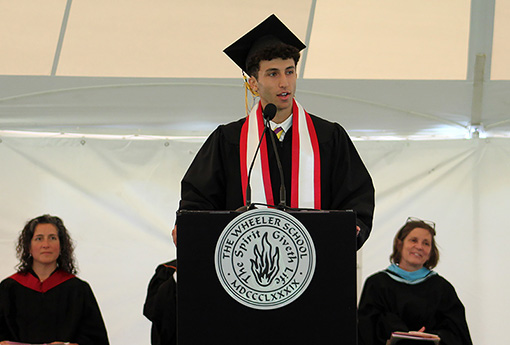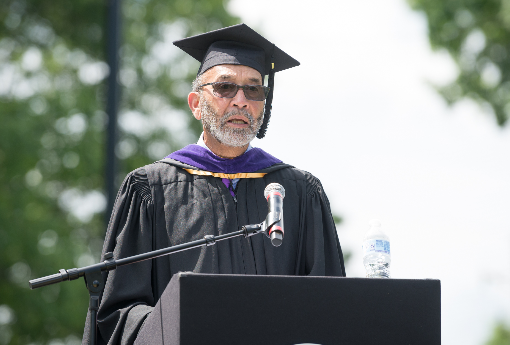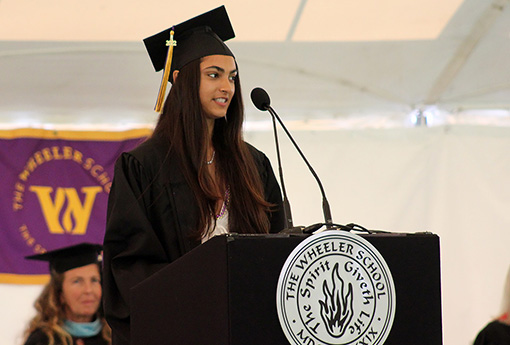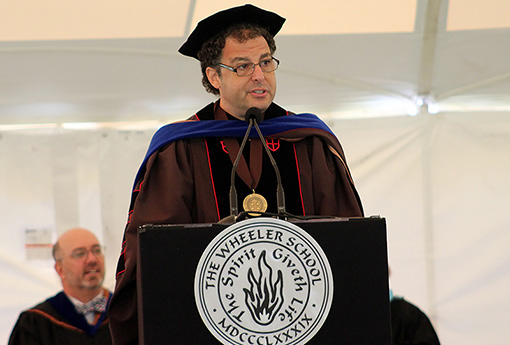
Graduation Address by The Hon. Edward Clifton P’02 ’98
June 12, 2020
Delivered June 12, 2020 to the 131st graduating class of The Wheeler School
WELL, HERE YOU ARE AT ONE OF THE POINTS IN YOUR LIFE WHERE YOU SHOULD BE CAREFREE. ENJOYING YOUR LAST MOMENTS AS HIGH SCHOOL STUDENTS. HANGING WITH YOUR FRIENDS. GETTING READY FOR THE NEXT ACT OF YOUR LIFE’S PLAY. SOME OF YOU MAY BE ASKING YOURSELF “WHAT DID I DO OR DID NOT DO TO DESERVE THIS? MY SHORT ANSWER IS NOTHING. HOWEVER GIVEN THIS EXPERIENCE, OF LIVING IN THE AGE OF A PANDEMIC, WHAT CHANGES HAVE TAKEN PLACE WITHIN YOU? WHAT ARE YOU PREPARED TO DO BECAUSE OF THOSE CHANGES?
I am truly honored and humbled to celebrate this day with you. Because of the necessary safety precautions stemming from the Covid-19 virus perhaps all of your relatives are not physically able to be here with you. But your teachers, your advisors, your coaches, your teammates, the foodservice preparers, the staff that maintains the buildings and grounds, and the administrators, also join in celebrating your graduation. Everyone who has in some way been instrumental to any degree in your development and lives are part of the sum total of who you are today.
As an African proverb proclaimed “It takes a village to raise a child.” That means that an entire community of people must interact with children to experience and grow is a safe and healthy environment. The villagers look out for the children.
You truly are a diverse class. You are, visually, a beautiful tapestry of differences. You may be gay, straight, or nonbinary. Not all of you come from the exact same circumstances. All of your guardians sacrificed something to help you get this far. Some of them comparatively more than others. Regardless, please do not let the opportunity pass to thank them for what they have done and may continue to do for you.
Most, if not all of you were born after September 11th, 2001. All of you were under the age of 10 when the policy decisions and the events, leading up to the Great Recession of 2008 took place. None of you were old enough to have voted in the 2016 General Election. Again, none of you were old enough to have been sitting at or around the desk and tables charged with the responsibility of preparing for a possible pandemic. So breathe deeply in the comfort that you had absolutely NO responsibility for any of these, to some, TRANSFORMATIVE things that have occurred during your lifetimes. But now you’re in a different place. As citizens of age in this country and in this world, the question I have for you is “Have any of these singular events RESULTED IN ANY TRANSFORMATION IN YOU?
Let me speak about some TRANSFORMATIVE EVENTS that occurred in my lifetime. In June 1964 three civil rights workers were reported missing in Philadelphia, Mississippi. Their deceased bodies were later found in August of 1964.
Also in August of 1964, after news later viewed as “ questionable or suspect” of an attack on two U.S. Navy Destroyer’s by North Vietnamese torpedo boats, President Lyndon Johnson submitted the Gulf of Tonkin Resolution to Congress. It was adopted. The Resolution authorized the President to “take all necessary measures to repel any armed attack against the forces of the United States.” Following its passage, almost ten years of overt but, sometimes covert, military actions by the United States were engaged in to suppress the pursuit of lessening class stratification and people seeking economic equality.
Both of these seemingly disparate events were taking place around me. I was aware of them but not thoroughly informed about either. To use a contemporary phrase, I was not “WOKE”. Then I was living in Berkeley California having moved from Los Angeles. My close friend and I moved to Berkeley for what we knew were all the right reasons that many young people had. Personal freedom! That reason was not tied to any global or national moral or political causes or objectives. Fairly clueless would be a perfect description of me. Carpe diem. The admonition to seize the pleasures of the moment without thought for the future was my agenda.
At the same time, thousands of citizens across this country were becoming aware of numerous seemingly isolated events. One result is that people became disturbed due to the lack of meaningful responses either by national, state, and local government officials to what they were feeling, saying and experiencing. They became more vocal in addressing what they, and many others, believed were years of oppression and injustices, such as discrimination in employment opportunities, housing, economic opportunities, the criminal justice systems, and voting rights they were forced to live under.
I continued to read about national and world issues. I continued to meet with, listen to, and associate with people who were more informed than I and tied to local, national and global causes. Experiencing all of this planted the seeds in me of the pursuit of more knowledge of the origins of national and international “injustices”. That quest for knowledge continues within me to this day.
In July 1966 I was drafted into the U.S. Army. This occurred during a pronounced buildup of U.S. military force. I was trained as a Field Artillery Surveyor. For context understand this was years before there were G.P.S. satellites traveling through space or devices such as “Google Maps” that could instantaneously and accurately pinpoint the location of people and objects on the face of the earth. As Artillery Surveyors our job was to make the determinations that computers now make. We were expected to do so in hostile and personally harmful environments. In a combat setting our life expectancy was thirteen minutes. Approximately 80% of my class of 50 received orders to go to Vietnam. Some of them did not come back alive. I suspect that many of those who did return did so suffering from PTSD. I considered myself lucky in that I received orders to report to Augsburg, Germany.
While stationed in Augsburg I was able to do some traveling while on leave. My favorite destination was Munich. I would take the train. The route then and now takes you past the small town of Dachau. Dachau was the location of one of the infamous Nazi concentration camps. Seeing the remains of that camp made a lasting indelible mark on me that continues to this day of the cruelty of men toward other humans.
I returned to the U.S. in January of 1968. I was transferred to Ft. Riley, Kansas for the last six months of my active duty. My plan, after my discharge was to return to Los Angeles to resume my life and my education. In April 1968 before leaving the Mid-West I traveled to San Antonio Texas to see my father and other relatives. On my flight back to Kansas, the pilot of the airplane made an announcement that Dr. King had just been assassinated. As a result, civil unrest demonstrations took place in Washington D.C., Newark, New York, Detroit, Providence, and many other cities across the United States.
I started law school at U.C.L.A. in September of 1972. Once again I was exposed to so many new and different experiences. In addition to my assigned studies I delved into a deeper understanding of why in the United States, despite all of its natural, financial, educational abundances, so many people were not treated as equal human beings. They were unable to live in safe decent housing, get a good education, and obtain fair medical care. They could not get ahead in their lives. It was during this time that I heard words spoken by Gil Scott-Heron.
Gil Scott-Heron was a 2002 posthumous Grammy Award winner “spoken word” performer during the 1970s and ’80s. He attended the Fieldston School, a prestigious independent school and member of the Ivy Preparatory School League, in New York City. At one point he was one of five black students in attendance at Fieldston. Later he attended Lincoln University, in Pennsylvania in part because Langston Hughes was an alumnus. Although he did not graduate from Lincoln, he later attended Johns Hopkins University where he earned his M.A. in creative writing in 1972. In 1971 he recorded an album entitled “Pieces of a Man”
On the album there was one song he wrote, that I found to be particularly meaningful: The song “Save the Children”. In the lyrics, he spoke of witnessing young children playing as children commonly do without any concern or knowledge of the host of issues occurring proximally around them or in the larger world. He sang that these children while playing, were also dreaming about their future careers. In the songs refrain the following words were sung:
We’ve got to do something, yeah, to save the children.
Soon it will be their turn to try and save the world.
Right now, they seem to play such a small part of,
The things that they’ll soon be right at the heart of.
Those words, in so many powerful, meaningful, and spiritual ways, were permanently stored into my personal memory bank. In some respects, those words have guided me as my personal anthem. From that point forward even today, I continually ask myself “what have you done today to save the children”?
I want to speak broadly about Economic disparities and injustices. Most of you leave Wheeler to continue to expand your knowledge and enter into professions that will hopefully motivate and sustain you. Regardless of your own or your family’s wealth, or status, you are all privileged. But as you travel to reach the goals you set for yourself you will undoubtedly come across people who are similarly privileged and those that are not. I invite you to continually ask yourself “Why are those that are not similarly privileged in that place? What did they do to be consigned to this state? What didn’t they do to be uplifted from that state?
In a Sunday, April 26, 2020, New York Times Opinion piece entitled “Economic Dignity for All” Gene Sperling, former economic adviser to Presidents Clinton and Obama wrote the following:
“Fifty-two years ago [March 28, 1968], when the Rev. Dr. Martin Luther King Jr famously asserted the dignity of all work, he seemed to foresee this moment when it would become clear that the labor of everyone-farmworkers, grocers, delivery drivers, caregivers, nursing assistants-was essential to all of our health and well-being.
“‘One day’ Dr. King told sanitation workers on strike, ‘our society will come to respect the sanitation worker if it is to survive, for the person who picks up our garbage, in the final analysis, is as significant as the physician, for if he doesn’t do his job diseases are rampant. All labor has dignity’”.
Sperling pointed out that today 47% of nursing, psychiatric, and home health aides are not offered single days of paid sick leave. A million front-line health care workers lack their own health coverage. The median pay for nursing assistants and orderlies in hospitals treating Covid-19 patients is $14.25 an hour. Farmworkers earn between $12-$14 per hour. Less than half have health insurance.
I do not profess to be a psychic or Nostradamus. I cannot predict the future.
Regardless, what do I see you as? I see you as the present and future deep thinkers. I see you as the present and future inventors. I see you as being the present and future creative artists. I see you as the present and future builders. I see you as the present and future leaders. I see YOU METAPHORICALLY speaking, as the present and future POLLINATORS-taking new information, call it pollen, and transporting the pollen as you move about from place to place spot to spot.
You have spent years here at Wheeler, applying yourself-learning things that were not only important to you but also important to the world that you have inherited. It is your right and your responsibility to pollinate the world with the knowledge that you have gained at Wheeler and will continue to gain, regardless of what you do beyond Wheeler and what your future dreams are
Always remember Wheeler’s motto “THE SPIRIT GIVETH LIFE”!
You have had Opportunities that others of your age have not had. Because of those opportunities you’ve received at Wheeler, you may become as instrumental as Dr. Anthony Fauci, Immunologist, Director of National Institutes of Allergy and Infectious Diseases in the United States. Or the now deceased Chinese Doctor, Li Wenliang, one of the first to publicly warn about the outbreak of the Coronavirus. Bryan Stevenson, Director of the Equal Justice initiative and celebrated author of Just Mercy. Dr. Mona Hanna-Attisha, author of What the Eyes Don’t See, an Iraqi immigrant pediatrician and professor of public health who made the world aware of the public water problems in Flint, Michigan.
You may become like Christian Cooper who politely asked another person to put a leash on her dog in a protected bird watching area of Central Park.
You may be able to cure the next COVID-19-like disease. You may be able to cure that American disease, racism.
In an article appearing in the April 2020 edition of The Atlantic Magazine entitled “The Perks of Being A Weirdo”, Olga Khazan a Staff Writer wrote in part about a theory of “Cognitive reappraisal” proposed by Rodica Damian, an assistant psychology professor at the University of Houston. “Thinking about your weirdness in a positive way”. This can help you cope with the adversity that often comes with being an outlier. This comes from examining what you may call “your own weirdness”. “Once you have experienced things that violate the norms and rules of expectations, you’re more open to more things like that.” “You experienced that the world doesn’t have to work by your rules, so you can break the rules.”
While your horizons and your futures are virtually unlimited I urge you not to forget or undervalue the people that in this pandemic were DEEMED “ESSENTIAL WORKERS“ who made your lives possible or at least easier. Do not forget all the people who labor in fields to pick the foods that make it to your tables. Do not forget all the people who labor in the factories producing the items that you consume. Do not forget the people that operate the means of transportation that you rely on getting from place to place. Do not forget the person that is keeping the electricity flowing. The day-care workers watch many young children so that their parents, who before the pandemic could go to work. All of these people and more like them are, in fact, essential for all of us.
In closing, I want to offer you words to remember. The first from legendary UCLA men’s college basketball coach John Wooden who not only excelled in coaching basketball he also provided great motivational thoughts about life. He said the following: “do not let what you cannot do interfere with what you can do.”
The other from American poet Ralph Waldo Emerson “Do not go where the path may lead. Go instead where there is no path and leave a trail.”
Thank you and good luck!


